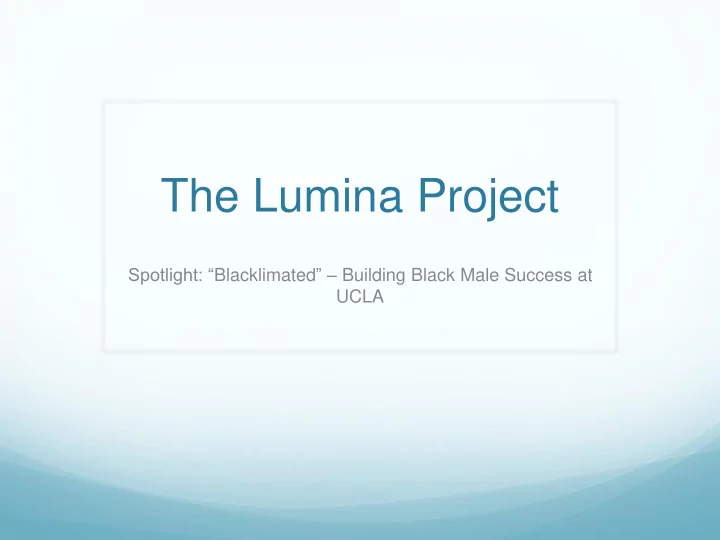

The Lumina Project Spotlight: “ Blacklimated ” – Building Black Male Success at UCLA
In the Mind of the African American Male at UCLA “Being a young black man I understand that I carry a lot of weight on my shoulder just by the title alone" “As a whole, to be successful at UCLA, [you] have to:…minimize stress, manage your finances, and make time for yourself. ” “To me attending a Research 1 University is bitter sweet; while I have many abundant resources that could greatly assist my academic growth I am not the priority of this institution's professors or administration ”
Literature Says… Allen, W. R. (1985). Black student, White campus: Structural, interpersonal, and psychological correlates of success. Douglas, K. B. (1998). Impressions: African American First-Year Students' Perceptions of a Predominantly White University. Harper, S. R. (2009). Race-conscious student engagement practices and the equitable distribution of enriching educational experiences. Liberal Education, 95 (4), 38-45.
Theoretical Framework Critical Race Theory Ladson-Billings, G. (1995). Toward a critical race theory of education. “Without authentic voices of people of color (as teachers, parents, administrators, students, and community members) it is doubtful that we can say or know anything useful about education in their communities”
Our Research Question(s) 1. How do African American males experience UCLA? a. What are their collective experiences? b. What is their knowledge about the resources that UCLA has to offer?
Methodology - Participants African American Males at UCLA Freshman Transfer (1 st year and Continuing) Seniors Athletes Dismissed
Qualitative Methodology Conducted Interviews Core Four Focus Groups African American Men from broader UCLA community Participants in our “ Blacklimated ” Class Observational Study of 10 “ Blacklimated ” Classes* Dynamics of first year freshmen vs. first year transfers Receptiveness to topics and presenters Student Reflections * Coding Recurring themes
Key Findings Comfort Finances Tokenization Resources
Comfort Findings Most mentioned the need for security and safety at UCLA 2.5 times 3.5 times it was mentioned that retention programs like the academic advancement program create a home base for them academically. On average 2 times, students stated they experience micro aggressive racial discrimination 2.5 times how much knowing other black males in college assisted in their adaptation to higher education
Finances Theme Finances play a critical part in the African American experience here at UCLA Role of Finances Without Financial Aid/Scholarships/loans African American students would have a hard time attending a large college/university (UCLA). View on Finances “…in relation with black in this institution is that when there is no financial aid to support them, they get pulled out of school and the dreams the black male has becomes shattered .” “I realized that I am extremely blessed in my financial situation here at UCLA, because before I received a few crucial scholarships, I too considered attending community college.”
Tokenization Being revered for academic and collegiate accomplishments Pressure from family, peers, and community Scarce numbers of African American males at UCLA “I don‟t have to wait until midterms and papers Affects psychological to be stressed, it seems to be an everyday activity for me. I encounter stress at every level wellness because of some unhealthy thinking patterns I have.” – Class Participant
Tokenization Rather than talk about themselves as the typical black male, students spoke of themselves outside of an aggregate group Students spoke of their experiences in contrast to those of the stereotyped black male Their reflections showed a struggle in negotiating their goals for success with outside expectations of failure.
Knowledge of Resources Many Black Males know that the resources UCLA has to offer are very essential to using. However, using the resources (i.e. office hours) are actually not the priority. i.e. - “My ignorant As a result, upon failure of classes, black men usually resort to self-blame. behavior cost me the grade I received to be honest” Problem: No Class About Increasing owns Retention But as one student explained, BMI served as that academic medium of assisting Black Males with their stay here on campus. CAPS, a resource that assists on psychological issues of students “…this workshop really got my attention because this is a topic that most black males put on the back burner” One of the students felt as though this resource would be helpful „when” the fall to the bottom. Sort of saying that its foreshadowing that failing will occur Finances although there are financial workshops in CAPS, they are not highly publicized nor welcoming As a result, “…many students take out loans not knowing that they may become victims of amazing debt”
Knowledge of Resources What exactly is the priority of the Black Male in education? Is it the social status they receive? Or the methods by which they use resources? What steps must the Black male take in order to find resources that are “not welcoming”? And why are psychological issues, which affects the health of the Black Male, put “on the back burner”? In all, the Black Male must define his own route to success and seek out resources instead of passively approaching his education; It is not his fault, but the challenge of his high school education.
Implications/Conclusion Teachers/Counselors should begin preparing students for college prior to the 11 th grade Summer Bridge programs should equip students with the skills to adapt, combat, and deal with discomfort Financial Aid should use more culturally relevant approaches to helping African American male students UCLA should increase diversity awareness and diverse education opportunities on campus Institutionalize campus interventions programs such as “ Blacklimated ”
Recommend
More recommend